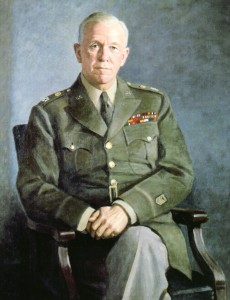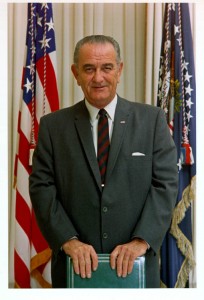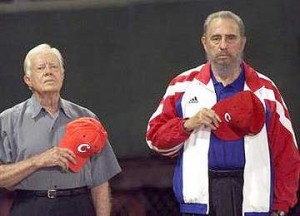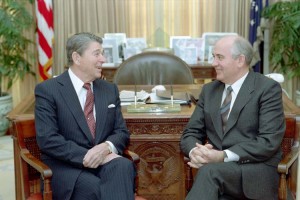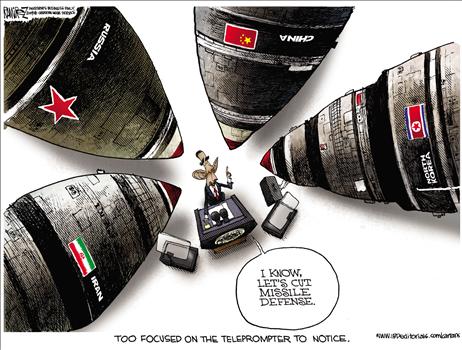In one of his European speeches last week, President Obama commented that the United States had sometimes been arrogant in its relations to other nations, and that we had not appreciated the Europeans. To be fair, he also noted that Europeans had spouted anti-Americanism as well, but the emphasis seemed to be on America’s arrogance.
Every nation displays arrogance at times, but has that been the hallmark of American interactions with others?
Think back to WWII for a moment: we were attacked by Japan, entered the war and helped overthrow the fascist empires. In fact, we played the key role. That’s not arrogance speaking; it’s simply the truth.
After the war, with Europe in bad shape and ripe for a Communist takeover, it was the US that came up with direct aid to those wartorn nations. Under the leadership of Secretary of State George C. Marshall, the Marshall Plan, as it was called, restored vitality and stability to our allies. That was not arrogance.
Throughout the Cold War, America was the bulwark of protection for all of Western Europe, countering the Soviet threat with our strong military. If not for us, Western Europe may have had to learn Russian.
Some point to the Vietnam War as an example of American arrogance. In the case of the president at that time, Lyndon Johnson, I can see some evidence for that belief. LBJ seemed to think he could just import his Great Society program into South Vietnam and create a smaller version of the US. He also personally directed bombing attacks, picking the targets himself. Delegation was not one of his strengths. In LBJ, I see personal arrogance, which showed in many of his policies, foreign and domestic. However, the aim of the US at that time was to stop the spread of Communism in Southeast Asia. There was nothing wrong with that goal.
Richard Nixon had his own problems, but he went to great lengths to support Israel during the Yom Kippur War. It can be argued that US aid at that time kept Israel from being overrun and destroyed. I don’t see arrogance there.
Jimmy Carter pushed a human rights policy, but its selectivity was destructive. He focused on American allies such as Iran and Nicaragua rather than the Communist nations that erased all human rights. The result: Iran fell to radical Islam and Nicaragua became a Soviet client state in the Western Hemisphere. Even today, Carter continues to support some interesting friends: Fidel Castro, Hugo Chavez of Venezuela, and Palestinian terrorists. I do detect arrogance in Carter’s demeanor, and it was present as well during his presidency in his attitude toward friendly nations. Unfortunately, his type of blindness afflicts many.
Ronald Reagan has been called a warmonger by the Left. Yet he was the president who, despite accurately labeling the Soviet Union an evil empire, reached out to its new leader, Mikhail Gorbachev, and led the world out of the Cold War. He pursued a policy of undermining the Soviets economically, forcing them to retreat from their aggressive policy of eventual world domination. He was strong, but not arrogant. At the time, no one believed the USSR would collapse, but Reagan played a significant role in ensuring it did.
Western Europeans loved Bill Clinton. To them, he was the new American, unlike his Republican predecessors who called the USSR evil [Reagan]Â and ousted tyrants like Noriega in Panama and Saddam Hussein from Kuwait [Bush I]. Yet personal arrogance was nearly perfected in Clinton. No president has ever clung to power as assiduously when under attack for lying under oath and turning the White House into a bed and breakfast, while simultaneously manfesting a libido that knew no boundaries.
The full scorn and wrath of the Europeans was turned instead upon George W. Bush for being a “cowboy” in his diplomacy. I have criticized President Bush for boasting about “shock and awe” as we entered the Iraq war, and I also believe it was presumptive to assume the mission was accomplished when it had only begun. So, yes, on that basis, there was some arrogance.
Yet the goal was not arrogant. The goal was to remove a tyrant who had the potential to threaten the world with biological weapons. The overthrow of the Taliban in Afghanistan was a response to 9/11—not a sign of arrogance, but a recognition of the reality of evil in the world.
I have no problem, though, assigning arrogance to a person who believes that receiving the nomination of his party for the presidency was the moment when the oceans’ rise began to slow and the planet began to heal. Can that type of arrogance create a blindness to the real problems in the world?
We will need God’s mercy to get us through the next few years.

